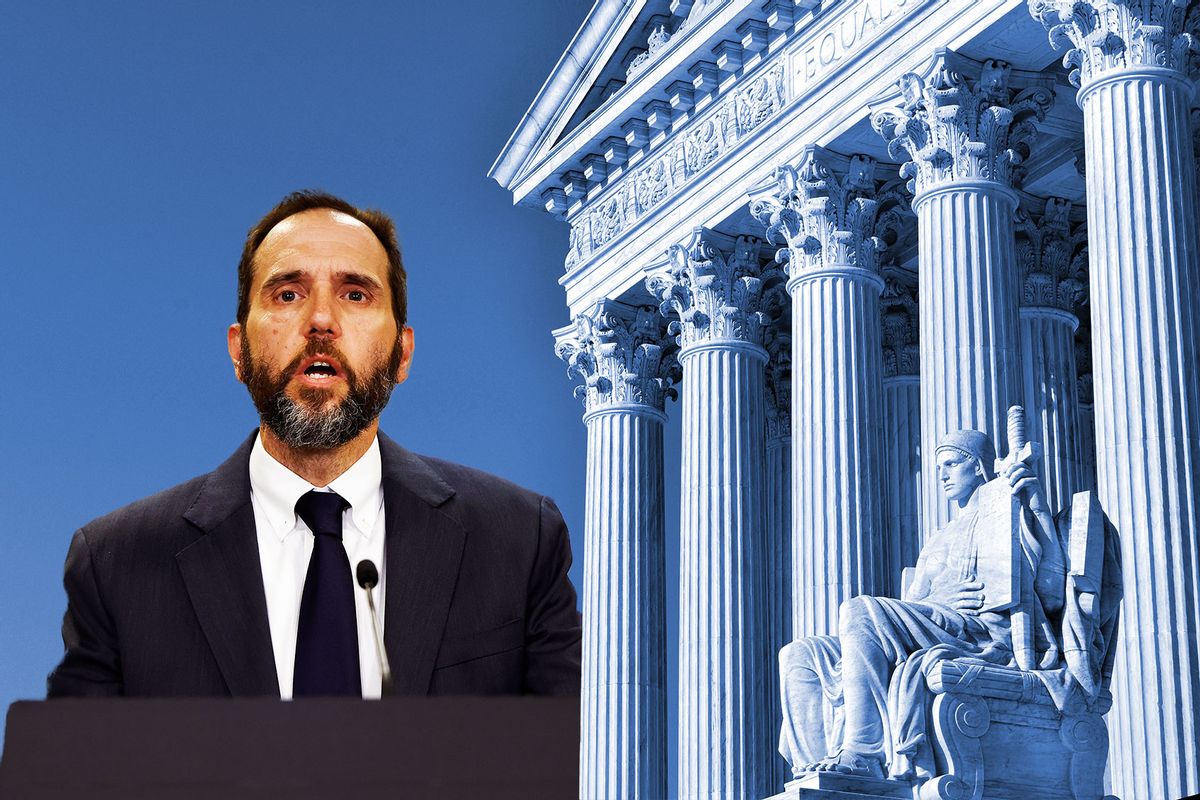Special counsel Jack Smith is expected to submit an “oversized” brief in former President Donald Trump’s election interference case in Washington D.C. by Thursday. The briefing is, in the view of the judge overseeing the case, needed to respond to the Supreme Court’s presidential immunity ruling.
Smith requested permission to exceed the normal length limits for briefs, seeking to file up to 200 pages of argumentation in the case, which immediately drew comparisons to past special counsel reports, like those from special counsels Robert Mueller or Robert Hur. This comes as a response to the Supreme Court’s ruling earlier this year, which found the president enjoys broad legal immunity for official “core constitutional acts.”
The Supreme Court ruling threw the prosecution of Trump for his efforts to overturn the results of the 2020 election into chaos and the new filing is an opportunity for Smith to make the case that Trump’s efforts do not qualify as official acts.
Attorney Ty Cobb, a former Trump White House lawyer, told Salon that the filing from Smith was appropriate and necessary in light of the recent Supreme Court ruling but he said that the filing likely won’t be like special counsel reports.
“The Mueller report [was] 400 pages of we ‘didn’t find anything,’ this will be 180 pages of evidence and the evidence will be powerful, undeniable and persuasive,” Cobb said. “The issue for the judge to decide is whether it infringes on official acts assigned to the presidency and whether it could chill any decision-making by the president if the areas involved cross that constitutional line.”
As for the potential that swaths of the filing may be redacted — something suggested by the fact that there will be a private and public version of the document — Cobb said that he thinks “the bulk of the evidence will be out there for public viewing.” He added much of the evidence, like Trump’s call to Georgia Secretary of State Brad Raffensperger, is already public.
James Sample, a constitutional law professor at Hofstra University, agreed that the filing was necessary in light of “the Supreme Court’s dramatic expansion of Presidential immunity,” saying that “an oversized, highly detailed legal brief, detailing with as much factual specificity as is possible, is not only appropriate, but necessary.”
“It is precisely because Mr. Trump, along with his nakedly partisan Supreme Court allies, has so stunningly succeeded in thwarting the truth-finding mechanism of an adversarial trial, that Jack Smith’s filing is essential both for the task of categorizing official and non-official acts, but also for the filing’s value in adding to the historical narrative of one of the gravest attacks on democracy in American history,” Sample said.
Sample went on to quote former Supreme Court Justice Louis Brandeis, who once said that “sunlight is the best disinfectant” in reference to the details expected in the filing and the potential for redaction.
“If the special prosecutor’s filing sheds light on the complex, violent, deadly and very-nearly successful effort to overturn the 2020 election, then, even apart from the filing’s legal necessity, the filing is a service to the nation,” Sample said.
Bennett Gershman, a former prosecutor and a law professor at Pace University, suggested that significant portions of the filing may be redacted “given the closeness to the upcoming election” but that many of the actions Trump took in his attempt to overturn the election results “clearly were not official acts.”
Gershman pointed to Trump’s statements on social media, threats made to former Vice President Mike Pence and his personal interactions with co-conspirators as examples of actions that were, in his opinion, clearly not official acts. He added that “Trump had no constitutional authority with respect to the functioning of the Legislative Branch, and Pence’s official responsibilities with the Legislative Branch,” in reference to Congress’ certification of election results
“The filing will hammer home these points, probably reveal and detail supporting evidence that has not yet been made public, and easily distinguish evidence of official acts,” Gershman said. “For Trump to claim presidential immunity for the actions described above is baseless and absurd.”
Want a daily wrap-up of all the news and commentary Salon has to offer? Subscribe to our morning newsletter, Crash Course.
Sarah Krissoff, a former federal prosecutor, predicted that the matter of redactions could be an area where the prosecution and defense might clash, noting that the Supreme Court’s ruling demands that the court engages in a “fact-dependent” inquiry to determine if something was an official act and that “Trump’s team very much does not want all those facts aired (and analyzed) in public.”
“The defense team wants the redactions to be as broad as possible, to protect against the dissemination of information that is damaging to the former President,” Krissoff said. “It is very likely that the judge has to weigh in on the scope of the redactions, given the competing interests of the government, the defense, and the press.”
One of the attorneys who represented Trump during the second impeachment trial, David Schoen, indicated that he thinks the move is politically calculated and that “you can be sure the Harris campaign will borrow allegations from the 180-page filing and use it.” He added that he sees the filing as violating Justice Department policy of not taking legal action against a candidate within 60 days of an election.
“They know the case will not go to trial before the election and they want to have an impact; so now they will lay out the bare accusations and their version of facts, without any meaningful vehicle for cross examination or for rebuttal and with no requirement that they actually be proven beyond a reasonable doubt,” Schoen said.
Read more
about Trump’s DC case
The post “The evidence will be powerful”: Legal experts say Jack Smith about to drop a bomb in Trump case appeared first on Patabook News .

